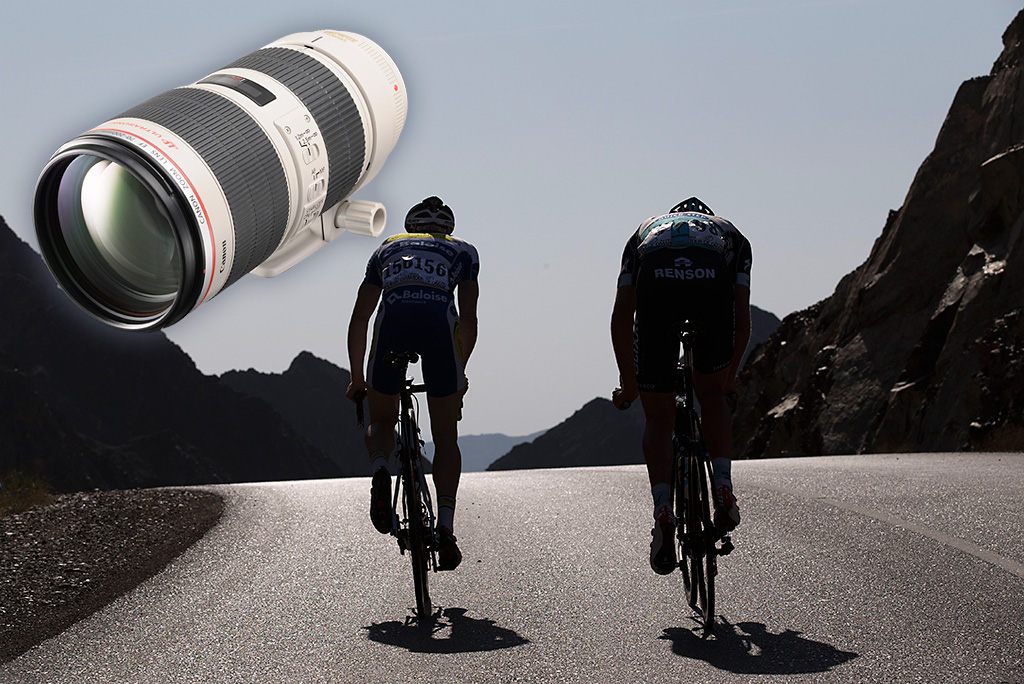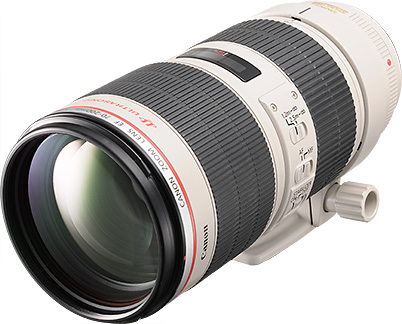Road racing is increasingly popular all over the world. The photographer whose works we feature in this article has covered road races in more than 40 different countries, and he has chosen the EF70-200mm f/2.8L IS II USM as his go-to lens. Read on as we introduce his vividly realistic shots of scenes captured on the road. (Reported by: Yuzuru Sunada)

A lens that gives excellent results under the harshest of conditions
Bicycle races are a type of sport that used to be popular mainly in Europe but has now spread to the entire world, and I photograph them all throughout the year. Moving from one race to another, my coverage in the past 27 years has spanned over 40 different countries.

EOS-1D X/ EF70-200mm f/2.8L IS II USM/ FL: 105mm/ Manual exposure (f/6.3, 1/640 sec.)/ ISO 800/ WB: Auto
The sunflowers go well with the Tour de France, which is held in midsummer every year. However, it is rare to come by an opportunity where all the conditions are in place, such the time of bloom, where the flowers are facing, weather and landscape.
When photographing a road race, I often ride pillion on a motorbike. Taking into consideration the frequent flights I have to take and also the narrow space when shooting from a motorcycle, the equipment I can bring with me is limited. In 2014, I lost my luggage during one of the trips. Although the bag was retrieved after a few days, the EF300mm f/2.8L IS II USM lens and my spare computer were gone. I believe they had been stolen by one of the airport staff, but it was impossible to track down the culprit as I had transited at too many airports. Having learnt my lesson, I now take my entire photo gear and two computers with me in my carry-on luggage.

EOS-1D X/ EF70-200mm f/2.8L IS II USM/ FL: 105mm/ Shutter-priority AE (f/10, 1/1,000 sec., EV-0.3)/ ISO 160/ WB: Auto
Cyclists naturally form clusters to fight against wind pressure in a road race. However, one has to break away from the group and fight the fight alone in order to emerge as the winner.
Whenever I shoot while riding pillion on a motorcycle, my preferred lenses are either the EF16-35mm f/4L IS USM or EF17-40mm f/4L USM as my wide-angle zooms, the EF300mm f/2.8L IS II USM as my telephoto zoom or the EF300mm f/2.8L IS II USM. At the same time, I would use a 1.4x or 2.0x extender and, whenever necessary, add a fish-eye lens or the EF24-70mm f/4L IS USM to this basic set. I have also been using the EF100-400mm f/4.5-5.6L IS II USM lately, which offers much better depictive capability than its predecessor of the same focal length range. As the new rotary zoom ring on this lens has enhanced its operability, I have been using it more frequently.
Among the lenses listed above, the one that I make use of most often is the EF70-200mm f/2.8L IS II USM. I have been using the EF70-200mm since its first generation, and feel that the image quality of the existing model is incomparably better than its predecessors, perhaps because it is designed for use with digital cameras. It is also possible to attach an extender to this lens, although I don’t often do so. The AF/MF selection switch on the previous model of this lens tended to move whenever my body touched it accidentally, which made my experience using it somewhat stressful. I even tried to trim away the protruding part of the switch but it did not help. This problem has been eliminated on the new model, and now I can enjoy a stress-free experience.

EOS-1D X/ EF70-200mm f/2.8L IS II USM/ FL: 150mm/ Shutter-priority AE (f/3.5, 1/1,250 sec., EV±0)/ ISO 3200/ WB: Auto
For the Tour de France, the yellow jersey indicates the team leader. Wearing the yellow jersey in this photo is Chris Froome, who was crowned champion for the second time in 2015.
During the race, it is not uncommon to encounter heavy downpour, or even snowfall. In the past, I used to use rain covers made in Australia, but no longer use them now thanks to the excellent drip-proof performance of the lenses. In fact, in the past 10 years, I have not experienced any damage from water entering my equipment. This applies not only to the EF70-200mm f/2.8L IS II USM, but also to all of Canon’s high-end models.
To me, the EF70-200mm f/2.8L IS II USM is indispensable to my shoots. There are more and more people photographing bicycle races, and sometimes I receive questions about which lenses to use. I always recommend them to add the EF70-200mm, including the f/4 version, to their lineup.

EOS-1D X/ EF70-200mm f/2.8L IS II USM/ FL: 200mm/ Manual exposure (f/6.3, 1/800 sec.)/ ISO 100/ WB: Auto
Road racing used to be a type of traditional sport in Europe, but is now becoming increasingly popular around the world. In recent years, events held in the Middle East in particular have been gaining a lot of attention.

EF70-200mm f/2.8L IS II USM
Lens construction: 23 elements in 19 groups
No. of aperture blades: 8 (circular aperture)
Maximum aperture: f/2.8
Minimum aperture: f/32
Closest focusing distance: 1.2m
Filter diameter: φ77mm
Size: approx. φ88.8×199mm
Weight: approx. 1,490g

Yuzuru Sunada
Born in 1961 in Toyama Prefecture. Based in Milan of Italy, Sunada photographs bicycle races throughout the year. He has covered 27 Tour de France races and published a number of books.

Digital Camera Magazine
A monthly magazine that believes that enjoyment of photography will increase the more one learns about camera functions. It delivers news on the latest cameras and features and regularly introduces various photography techniques.
Published by Impress Corporation

































